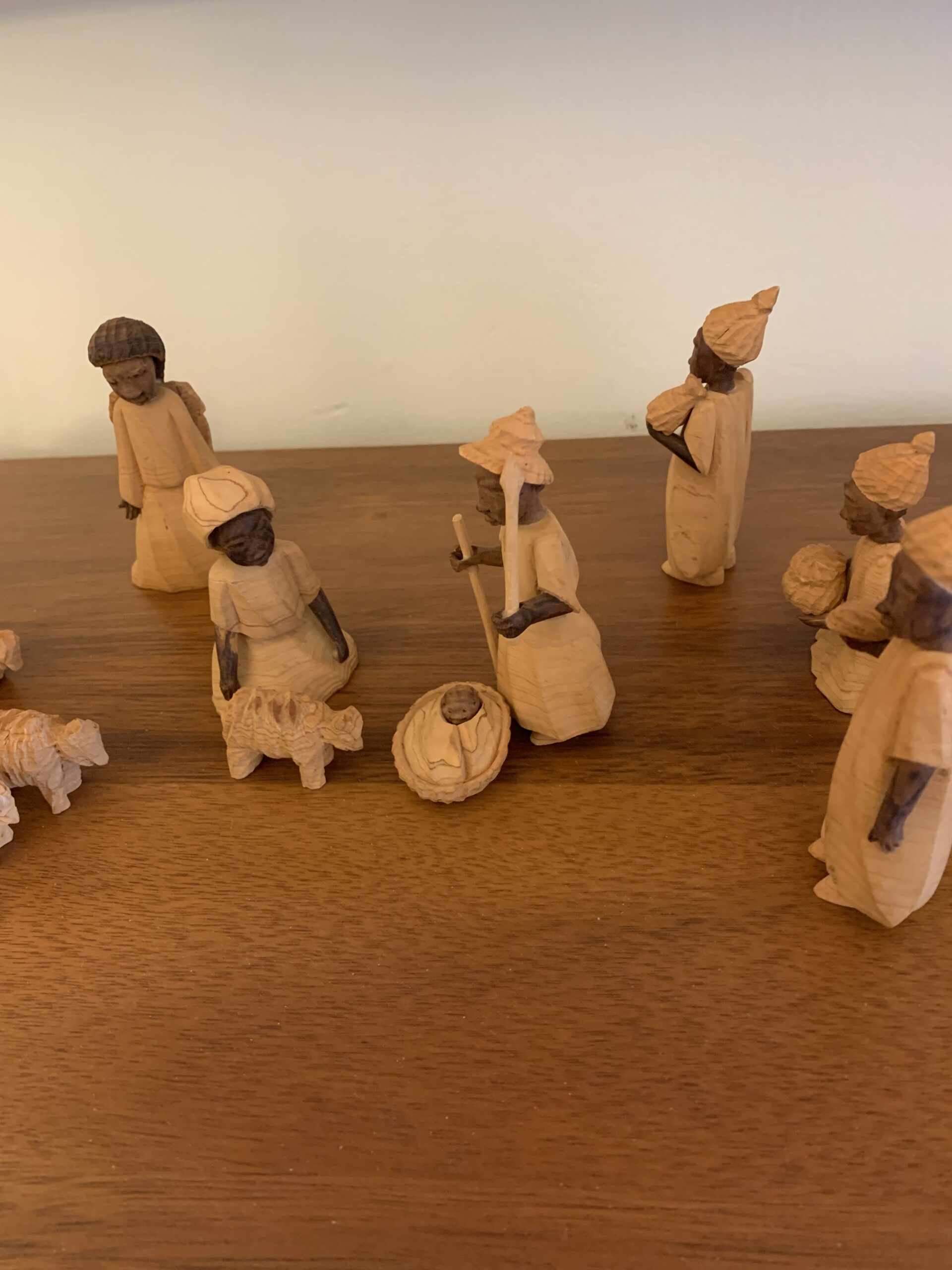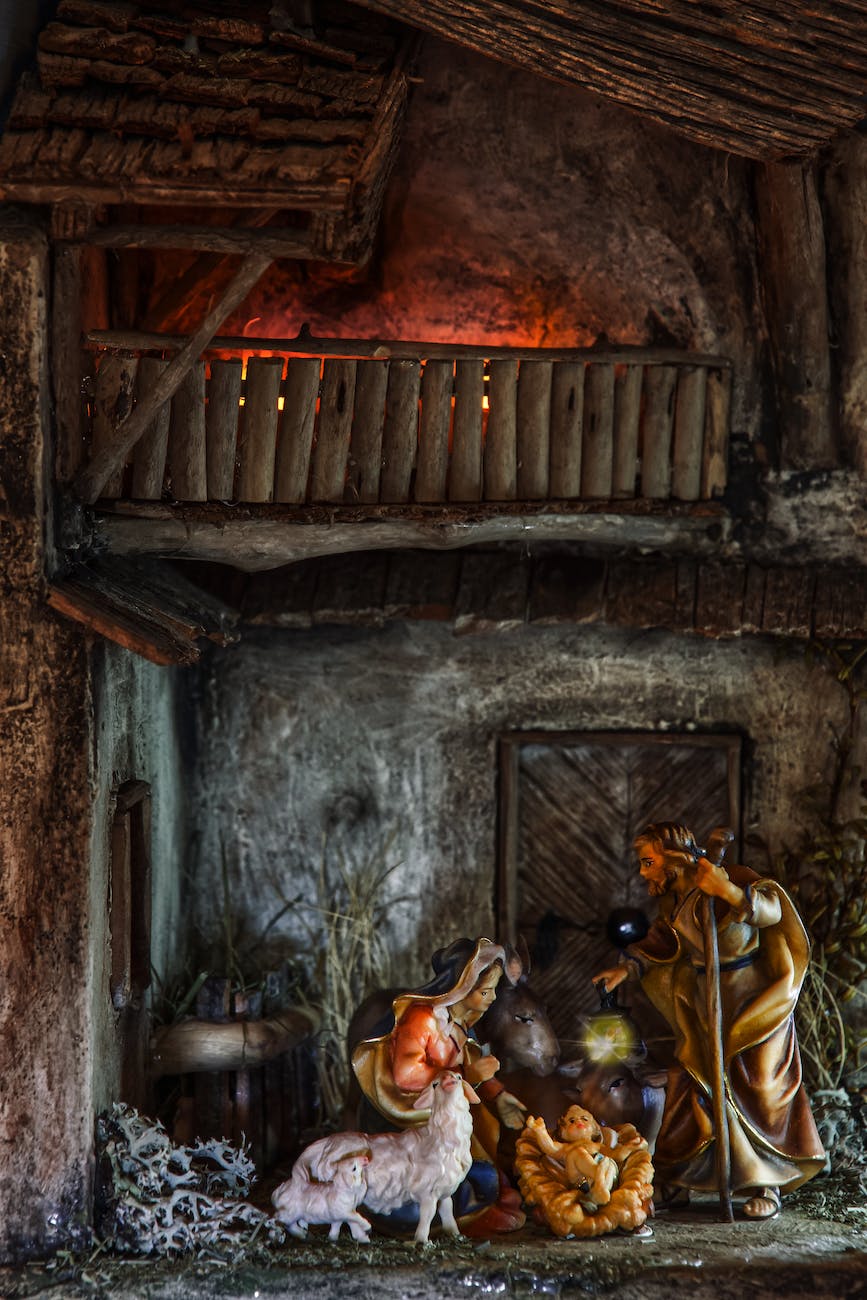
No, this isn’t my Christmas tree. It belongs to New York’s Metropolitan Museum of Art; and, yes, it is a real showstopper.
Jacquie and I visited the museum to look at Nativity scenes for a project Jacquie was doing for our church.
I’ve been contemplating what we saw ever since. The two that stand out for me are the one above and this one:

The Nativity and Annunciation to the Shepherds. Carving from the portal of an unknown church ca. 1275–1300. The New York Metropolitan Museum of Art.
Quite a contrast!
Yet, both are recognizable as “manger scenes.”
It may surprise you that there are few depictions of Christ’s birth before the 1200s.
Peter, Paul, and other early Christians celebrated Easter every Sunday. However, no one celebrated Christmas for the first two or three hundred years after Jesus’ birth. It wasn’t until the fourth century that a church council set the date of the Feast of the Nativity on December 25.
Almost a millennium later, St. Francis of Assisi (d. 1226 CE) popularized the manger scene.
We seminary graduates like to talk about “incarnation” at Christmastime. Ask us what incarnation means, and we will quote John’s gospel, “The Word became flesh and dwelt among us.” Ask us what that means, and we will open our mouths . . . and nothing will come out.
A linguist once said, “A word only has meaning if you can put your hand over your mouth and point.”
St. Francis didn’t talk about the Incarnation; he lived it. He also pointed to it when he saw it. And he saw it in the birth of Jesus. Instead of preaching to the poor about what St. Paul meant when he wrote, “God was in Christ reconciling the world to himself” (2 Cor. 5:19), St. Francis created what the French call a crèche. Thus, he put his hand over his mouth and pointed to the baby in the manger.
Soon, Francis’s followers were creating these scenes all over Italy during the 12 days between the Feast of the Nativity (December 25) and the Feast of the Epiphany (January 6), when the Wisemen offer Jesus their gifts of gold, frankincense, and myrrh.
What moved people was not simply seeing the scene. It was being part of it. Like the shepherds and the Magi, they, too, came to the manger.
The Met’s 17th-century Neapolitan figures and the children that I inadvertently caught in my photo remind me of an experience I had forty years ago.
The church I served then had a tradition of creating a live outdoor manger scene every Christmas. The scene included cows and sheep, shepherds and kings, Mary and Joseph, and a doll—the only thing that wasn’t alive. This was December in Northeast Ohio, after all.
People came from all over the area to see it. Some just drove by. Others parked and came over, their coats from LL Bean, Walmart, or Goodwill mixing with our shepherd’s costumes. They were like the people of Bethlehem who heard about the angels and the birth from the shepherds and “were amazed” (Luke 2:17-18 NRSV).
The museum’s carved Neapolitan figures represent all the characters from the Bible stories. They also depict folk tales that have grown up around the birth of Jesus. The artists used their seaport city’s multi-ethnic, multicultural residents as models.
This picture shows the meaning of some of the Bible’s most mysterious words. Jesus says, “I will draw all people to myself” (John 12:32). We seminary graduates like to call this “high Christology.”
Sadly, some of the loudest “Christians” in our country don’t believe in it. Only people who fit the Procrustean beds of political belief, gender conformity, or White middle-class Protestant respectability, can “come to Jesus.”
You probably can tell how I feel about those folks.
But the older Nativity scene confronts my contempt for them.
Look at it again. The nativity forms the left side of the sculpture. It is pretty simple compared to the cast of thousands under the tree. Joseph is standing at the foot of the bed that Mary is lying on. Jacquie says an exhausted Mary makes a lot more sense to women who have given birth than the theologically correct Mary, who kneels in reverence next to her divine son’s manger.
Above their heads (artists had not yet discovered the mathematics of perspective) is the manger with the baby Jesus. And above the baby Jesus are the heads of two animals: an ox and an ass.
The ox and ass are in every manger scene from the Middle Ages and the Renaissance. They refer back to a verse from Isaiah written seven centuries earlier:
“An ox knows its owner,
A donkey its master’s crib:
Israel does not know,
My people take no thought.”
(Isaiah 1:3 Revised JPS)
In other words, folks who call themselves “God’s people” (and that goes for most of us who think we are Christians) are dumber than an ox and a stupid ass. The ox doesn’t say, “Well, I’m not going to eat from the same manger as that ass.”
All kinds of people. That’s the other thing about the ox and the ass. According to biblical law, the ox is a “clean” animal. The ass is an “unclean” animal. Bible scholars have theories, but they don’t really know why animals with a split hoof and chew their cud are clean, and those who don’t are unclean.
In other words, it makes as much sense as my not wanting to hang out with Trump voters.
The mystics of all religions say that in our spiritual development, we need binaries like good and evil, male and female, Republicans and Democrats, divine and human, and oxen and asses. These binaries create our moral consciousness and teach us to make responsible choices. That is what grown-ups do.
But on the other side of that moral consciousness is a wholeness that brings the opposites together. Only Love and Light can pull everyone and everything together. (Colossians 1:15-17) Your spiritual journey and the spiritual journey of the human race will take us all there someday.
As the Sufi poet Rumi says:
“Out beyond ideas of wrongdoing and right-doing,
There is a field. I’ll meet you there.”
Love is in the manger. The ox and the ass know that they are sustained by love. Most of us are too dumb to know that, except maybe at Christmas.
Most of us lament the polarization and increasing hostility in our society. Is there any way to overcome it?
There is a way — in the manger.

















